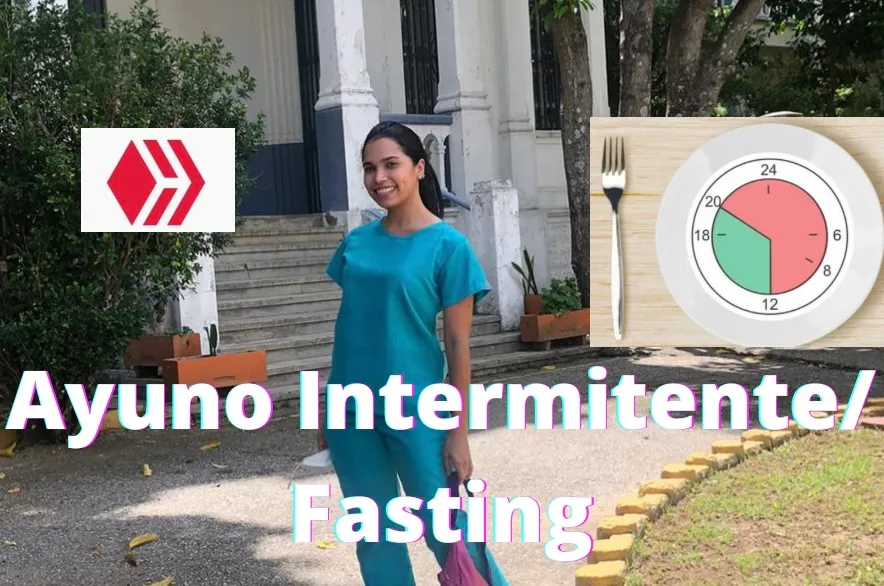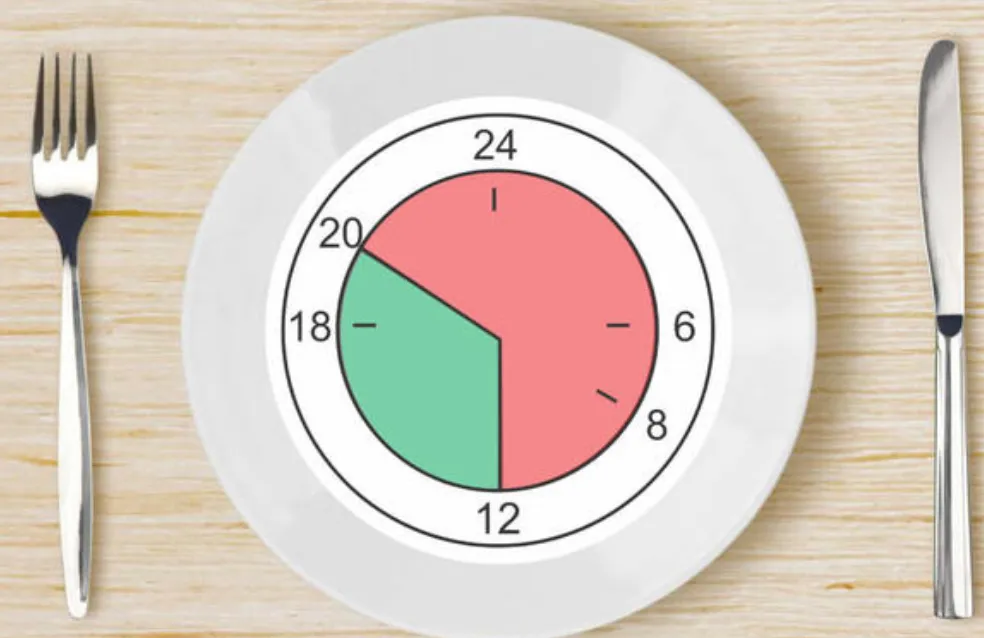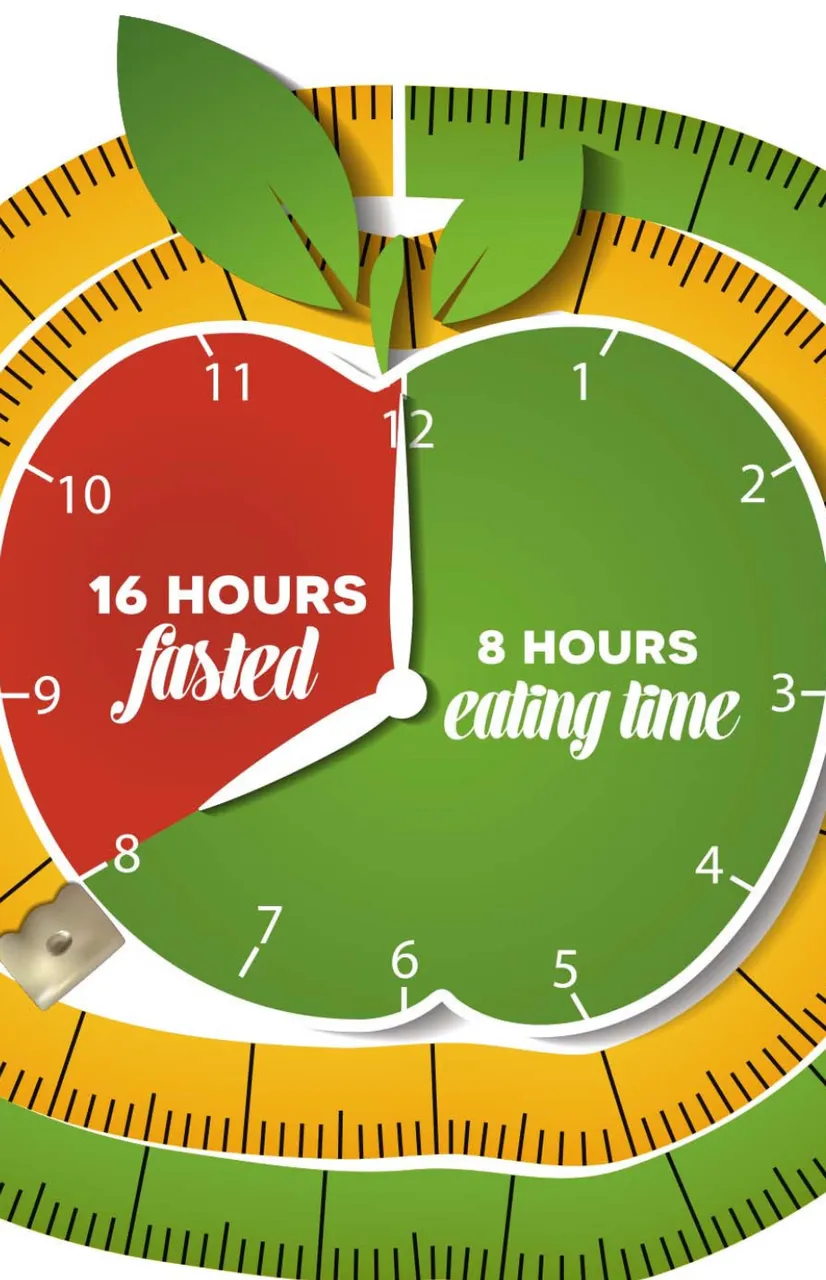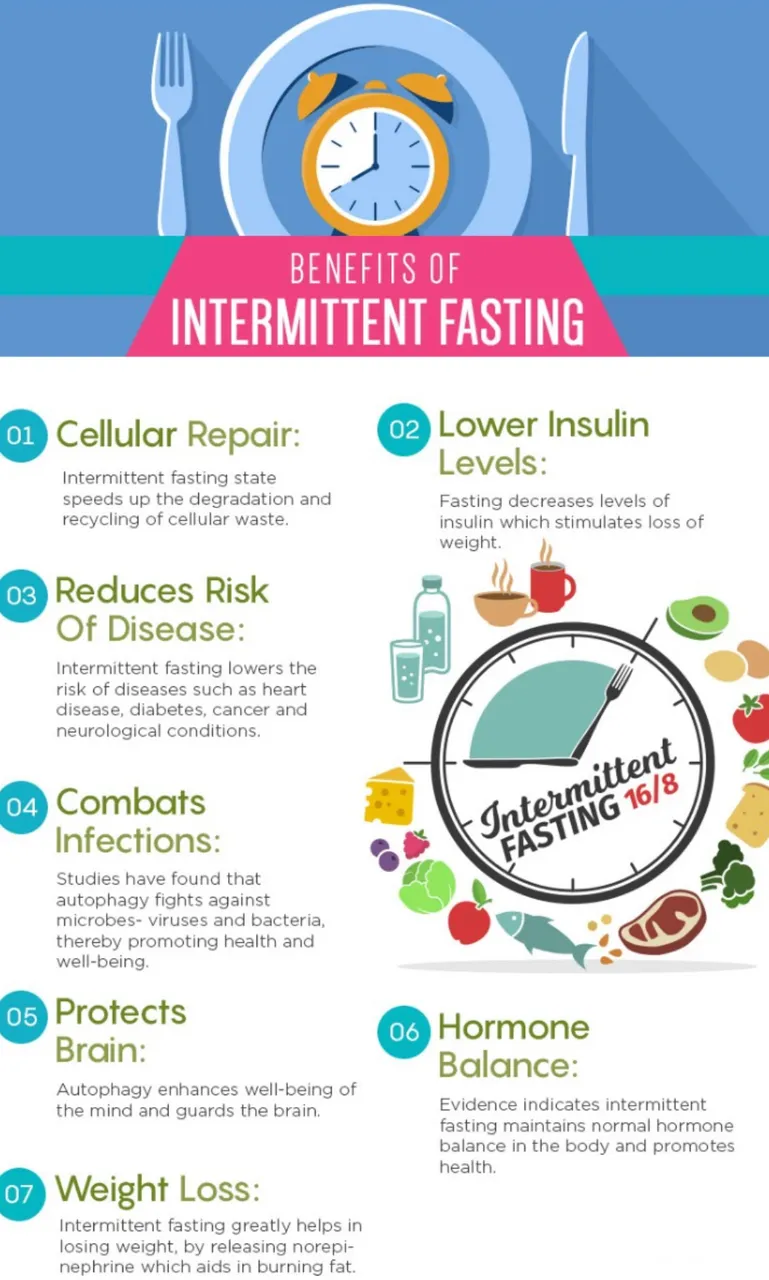¿Que es el ayuno y cuales son sus beneficios?
Fasting: What is it and what are its benefits?

Hello friends of Hive I hope you are very well, today I wanted to share with you the benefits that can bring the incorporation of fasting as a diet, I want to talk about the subject so you know better what this practice is about and in case you are looking for a way to lose weight take into account fasting as a possible diet.
Es importante saber que existen muchos tipos de régimen alimenticios que podemos poner en práctica y todo esto va a depender de nuestros hábitos y costumbres, evidentemente si eres una de esas personas que no puede salir de casa sin desayunar el ayuno no es lo más adecuado para ti, existen muchas otras prácticas que quizás se adapte mejor a las necesidades y hábitos de cada persona en específico además todos los organismos son diferentes y lo que para alguien puede ser fácil para otra persona puede ser imposible de cumplir, por eso si estás buscando algún tipo de alimentación saludable te invito a que investigues muy bien sobre cada uno de los diferentes regímenes alimentarios y escojas el que más se adapte a tus hábitos y necesidades personales, además es mi responsabilidad decirte que en el caso de que presentes algún tipo de enfermedad o trastorno alimenticio como obesidad mórbida o bulimia debes acudir lo más pronto posible a un médico y a un nutricionista que en este caso decidirán cual es la mejor manera de llevar tu caso, bajo ningún concepto utilices este post como una invitación a que adoptes el ayuno intermitente, mi intención con este post es que conozcas más al respecto y sobre los beneficios que puede traer para la salud.
It is important to know that there are many types of diets that we can put into practice and all this will depend on our habits and practices, obviously if you are one of those people who can not leave home without breakfast fasting is not the most suitable for you, there are many other practices that may be better suited to the needs and habits of each specific person also all organisms are different and what for someone may be easy for another person may be impossible to achieve, so if you are looking for some kind of healthy alimentation I invite you to investigate very well about each of the different diets and choose the one that best suits your personal habits and needs, it is also my responsibility to tell you that in case you have some kind of disease or eating disorder such as morbid obesity or bulimia you should go as soon as possible to a doctor and a nutritionist who in this case will decide what is the best way to handle your case, under no circumstances use this post as an invitation to adopt intermittent fasting, my intention with this post is that you know more about it and about the benefits it can bring to your health.
Lo primero que debemos conocer es ¿Qué es el ayuno intermitente? El ayuno intermitente es un régimen alimenticio que consiste en limitar la cantidad de horas diarias que disponemos para alimentarnos, debe entenderse que el ayuno intermitente no es necesariamente una dieta si no la práctica de disminuir la cantidad de horas que utilizamos al día para comer. Teóricamente el hecho de disminuir la cantidad de horas que utilizamos para comer traerá un déficit calórico que nos ayudaría a bajar peso en el caso de que eso busquemos, sin embargo el ayuno también puede ser practicado por personas que no tienen intención de perder peso. El ayuno tiene diferentes variaciones pero en este post hablare de la forma más común de ayuno y la que personalmente practico.
The first thing to know is what is fasting?fasting is a nutritional practice that consists of limiting the number of hours a day that we have to eat, it should be understood that fasting is not necessarily a diet if not the practice of reducing the number of hours we use per day to eat. Theoretically the fact of decreasing the amount of hours we use to eat will bring a caloric deficit that will help us to lose weight in the case that we are looking for, however, fasting can also be practiced by people who do not intend to lose weight. Fasting has different variations but in this post I will talk about the most common form of fasting and the one I personally practice.
Práctico ayuno desde hace más de 2 años y me ha funcionado de maravilla, me mantengo en mi peso ideal y además estoy saludable. Principalmente el ayuno consiste en la interrupción voluntaria de la alimentación por un periodo prolongado, sin embargo en mi caso la meta no es comer menos cantidad de calorías si no las mismas calorías en menor tiempo. Mi ayuno es de 14-16 horas es decir realizo tres comidas al día en un periodo de 8-10 horas, por ejemplo, Un día normal rompo el ayuno a las 12 del mediodía, realizo mi segunda comida alrededor de las 4pm y por ultimo realizo la cena alrededor de las 8 pm para totalizar 8 horas de comida por 16 de ayuno. Una de las preguntas más comunes es ¿Cuándo estoy en ayuno puedo tomar agua o café? Por supuesto que sí!! El agua es una sustancia que no supone calorías para el organismo, además de agua podemos consumir cualquier tipo de infusión como te o café sin azúcar por supuesto o con edulcorante. Como pueden ver es un régimen sencillo que no supone muchos tecnicismos ni nada especial, es el simple hecho de disminuir la cantidad de horas para alimentarnos.
I have been fasting for more than 2 years and it has worked wonders for me, I stay at my ideal weight and I am healthy. Fasting mainly consists in the voluntary interruption of food for a prolonged period of time, however in my case the goal is not to eat less calories but the same calories in less time. My fast is 14-16 hours, that is, I eat three meals a day in a period of 8-10 hours, for example, on a normal day I break my fast at 12 noon, I eat my second meal around 4pm and finally I eat dinner around 8pm to total 8 hours of food for 16 hours of fasting. One of the most common questions is when I am fasting can I drink water or coffee? Of course you can! Water is a substance that has no calories for the body, in addition to water we can consume any type of infusion such as tea or coffee without sugar of course or with sweetener. As you can see it is a simple diet that does not involve many technicalities or anything special, is the simple fact of reducing the amount of hours to feed.
Bien ahora que entendemos que es el ayuno y cómo podemos ponerlo en práctica podemos hablar un poco sobre los beneficios que puede aportar al organismo. El ayuno induce a muchos cambios en las células y en el metabolismo del organismo en general como respuesta a la falta de nutrientes, luego de 12 a 36 horas de ayuno, el cuerpo humano entra en un estado fisiológico de cetosis caracterizado por niveles bajos de glucosa en sangrey la producción hepática de cuerpos cetónicos que sirven como fuente importante de energía para el cerebro, Luego de varios días de iniciar el ayuno, las cetonas se convierten en la fuente de combustible preferida del cerebro, proporcionando hasta 70 % de sus necesidades energéticas. Las cetonas constituyen una fuente de energía más eficiente que la glucosa en los músculos y en el cerebro, mejorando la actividad conectiva de las neuronas, Sin embargo, las cetonas son más que una fuente de energía para las neuronas además cumple importantes funciones de señalización al inducir ciertos procesos metabólicos y aumentan la resistencia las neuronas a lesiones y enfermedades. Además cuando estamos en ayuno las células de nuestro organismo participan en procesos de regeneración de tejidos es decir ayuda con la cicatrización, también genera cambios metabólicos de resistencia al estrés que produce el ayuno lo que genera un efecto antiinflamatorio.Colectivamente, el organismo responde al ayuno intermitente minimizando los procesos anabólicos (anabólicos son aquellos procesos mediante los cuales a partir de compuestos sencillos se producen moléculas más complejas), favoreciendo los sistemas de mantenimiento y reparación, mejorando la resistencia al estrés, reciclando moléculas dañadas, promoviendo la supervivencia celular. También Influye en los procesos de síntesis y degradación celular que limita el consumo de nutrientes y se promueve la autofagia.
Now that we understand what fasting is and how we can put it into practice, we can talk a little about the benefits it can bring to the body. Fasting induces many changes in the cells and in the metabolism of the organism in general as a response to the lack of nutrients, after 12 to 36 hours of fasting, the human body enters a physiological state of ketosis characterized by low blood glucose levels and the hepatic production of ketone bodies that serve as an important source of energy for the brain. After several days of fasting, ketones become the preferred fuel source of the brain, providing up to 70% of its energy needs. Ketones are a more efficient source of energy than glucose in the muscles and brain, enhancing the connective activity of neurons. However, ketones are more than a source of energy for neurons; they also serve important signaling functions by inducing certain metabolic processes and increase the resistance of neurons to injury and disease. In addition, when we are fasting the cells of our body participate in tissue regeneration processes, i.e. helps with healing, also generates metabolic changes of resistance to stress that produces fasting which generates an anti-inflammatory effect, collectively, the body responds to intermittent fasting minimizing anabolic processes (anabolic are those processes by which from simple compounds more complex molecules are produced), favoring the maintenance and repair systems, improving resistance to stress, recycling damaged molecules, promoting cell survival. It also influences the processes of cell synthesis and degradation, limiting the consumption of nutrients and promoting autophagy.
La Autofagia es un proceso importantísimo que fue descubierto por el científico japonés Yoshinori Ohsumi, este descubrimiento le valió el premio Nobel en Medicina en el año 2016, en resumen el japonés estudio por años un proceso que sucedía en ciertos hongos el cual fue denominado autofagia, el científico logro descubrir que en las células de nuestro organismo ocurre un proceso similar pero aún más sofisticado que el de los hongos en el cual las diferentes estructuras de una célula que se encuentren deterioradas o aberrantes, son secuestradas por la misma célula y liberadas dentro del lisosoma para su descomposición y eventual reciclado este proceso se ha catalogado como una herramienta que permite a la célula obtener energía, ácidos grasos y aminoácidos permitiendo su supervivencia en condiciones adversas, también ha demostrado ser crucial en la prevención de muchas enfermedades entre ellas la Diabetes y el Cáncer.
Autophagy is a very important process that was discovered by the Japanese scientist Yoshinori Ohsumi, this discovery earned him the Nobel Prize in Medicine in 2016, in summary the Japanese studied for years a process that happened in certain fungi which was called autophagy, the scientist managed to discover that in the cells of our body a similar process occurs but even more sophisticated than that of fungi in which the different structures of a cell that are deteriorated or aberrant, This process has been catalogued as a tool that allows the cell to obtain energy, fatty acids and amino acids allowing its survival in adverse conditions. It has also been shown to be crucial in the prevention of many diseases including Diabetes and Cancer.
En estudios recientes se ha determinado que el Ayuno promueve la autofagia ya que sería una manera natural de activar este proceso, sin embargo estas son afirmaciones científicas que aún están en estudio pero todo parece indicar que efectivamente el ayuno intermitente puede ser un mecanismo de gran utilidad para evitar el envejecimiento celular y activar la autofagia, lo que en teoria podría ayudar en ciertas enfermedades metabólicas como la diabetes e inclusive el cáncer. En resumen el ayuno es una práctica que puede aportar múltiples beneficios para el organismo como: Prevenir la inflamacion, mejorar la cicatrización, reducir el envejecimiento celular, ayuda a regular nuestro balance hormonal y metabolico, nos ayuda a mantenernos en nuestro peso ideal entre otras. Por ultimo vuelvo a recordarte que en el caso de que poseas algún tipo de enfermedad o algún desorden alimenticio no deberías adoptar ningún régimen alimenticio antes de consultar con tu médico y un nutricionista. Esto fue todo por hoy amigos, espero que les haya gustado, si tienes alguna pregunta dejame saber en los comentarios
In recent studies it has been determined that fasting promotes autophagy as it would be a natural way to activate this process, however these are scientific claims that are still under study but everything seems to indicate that fasting may indeed be a very useful mechanism to prevent cellular aging and activate autophagy, which could help in certain metabolic diseases such as diabetes and even cancer.
In summary, fasting is a practice that can bring multiple benefits to the body such as: prevent inflammation, improve healing, reduce cellular aging, helps regulate our hormonal and metabolic balance, helps us to maintain our ideal weight among others. Finally I remind you again that in case you have any type of disease or eating disorder you should not adopt any dietary regimen before consulting with your doctor and a nutritionist. That's all for today friends, I hope you liked it, if you have any questions let me know in the comments.




